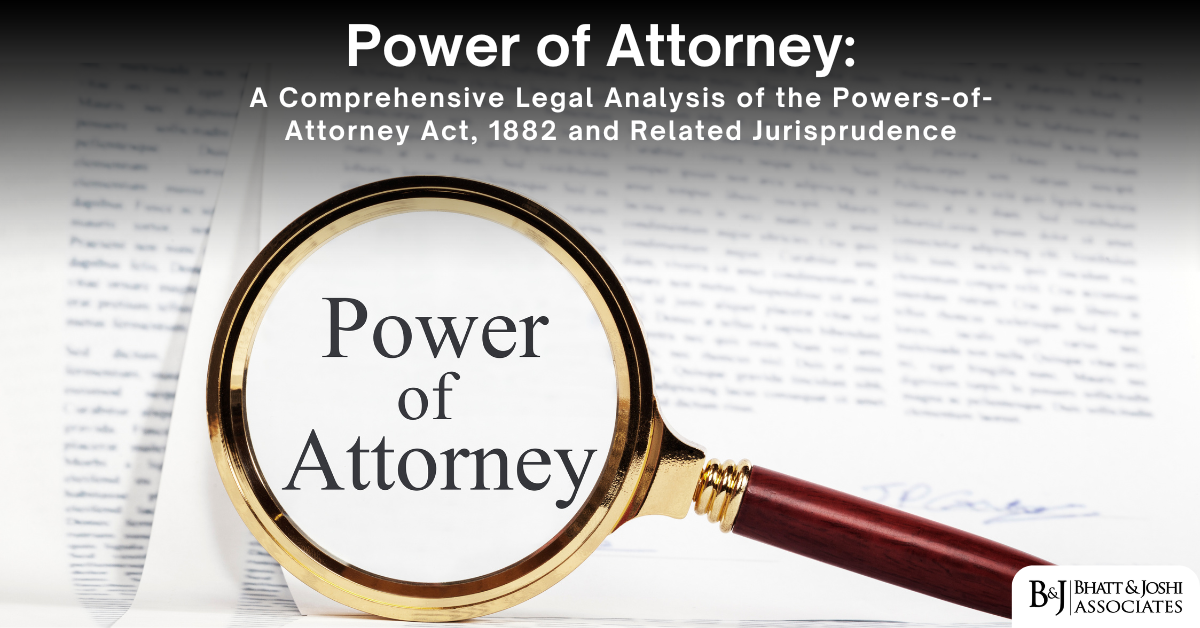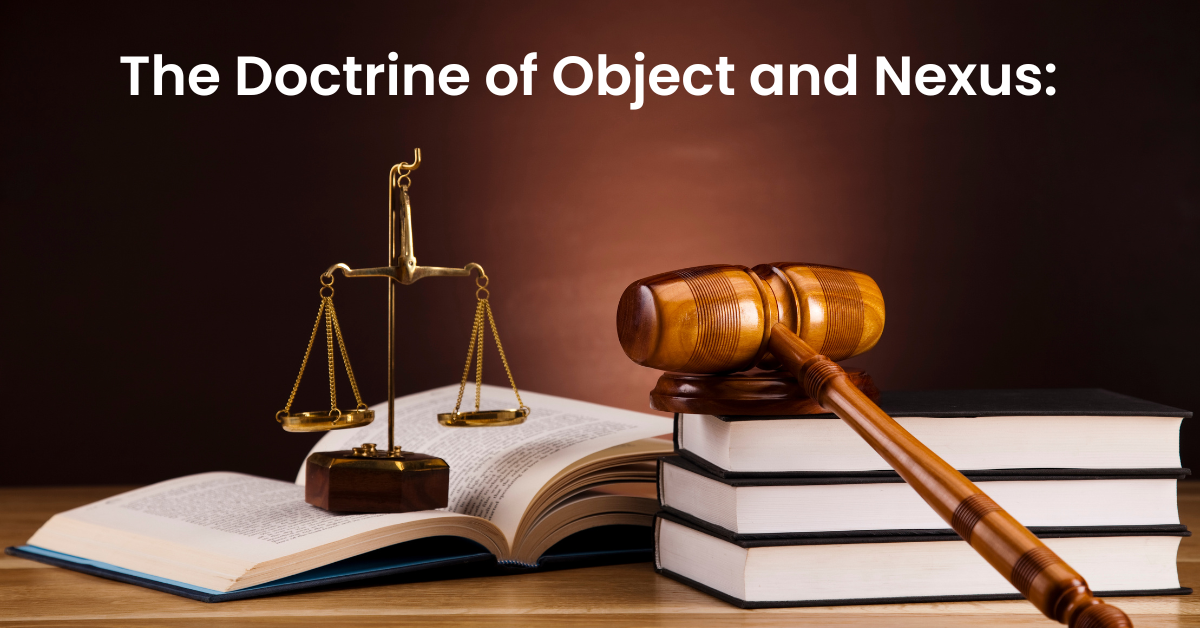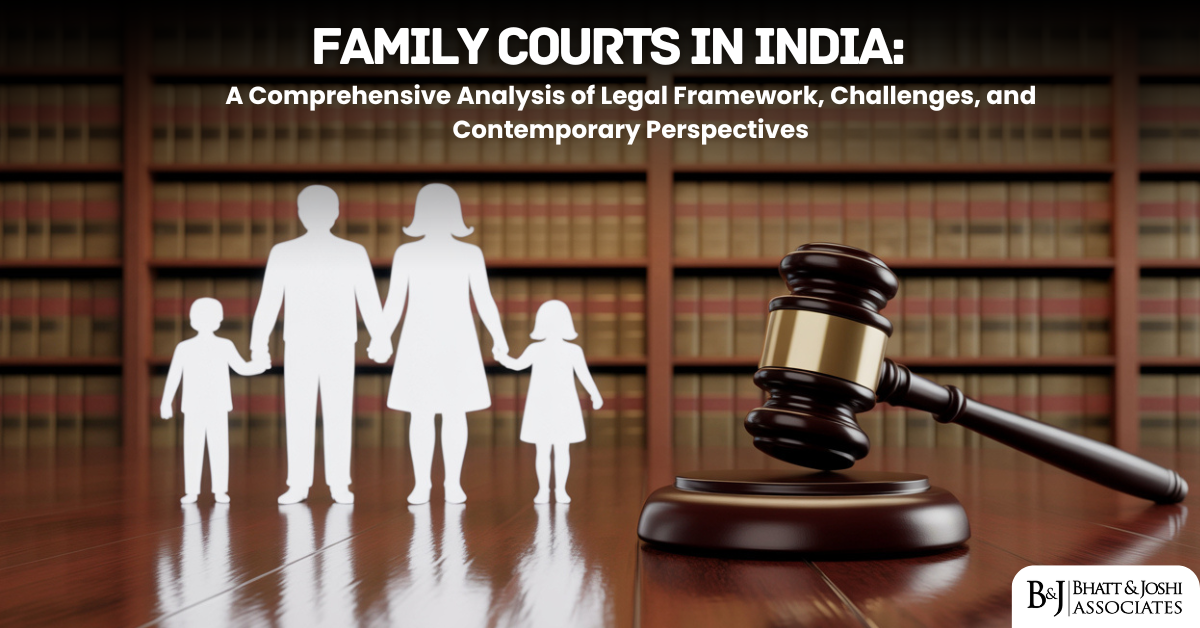Introduction
In contemporary commercial and legal practice, the execution of Power of Attorney has become an indispensable instrument for facilitating business transactions and personal affairs across diverse sectors of the economy. The increasing complexity of modern commerce, coupled with globalization and the accelerated pace of business operations, has necessitated the delegation of legal authority through carefully structured legal instruments. As defined under Section 1A of the Powers-of-Attorney Act, 1882, “Power-of-Attorney” includes any instruments empowering a specified person to act for and in the name of the person executing it [1]. This foundational definition establishes the legal framework for understanding the nature and scope of authority delegated through such instruments.
The Powers-of-Attorney Act, 1882, represents a comprehensive legislative framework designed to regulate the creation, execution, and operation of power of attorney instruments in India. This statutory enactment serves as the cornerstone for understanding the legal implications, procedural requirements, and substantive rights associated with the delegation of legal authority through power of attorney instruments.
Historical Development and Legislative Framework
The Powers-of-Attorney Act, 1882: Genesis and Scope
The Powers-of-Attorney Act, 1882 (Act No. VII of 1882) came into force on May 1, 1882, following its passage on February 24, 1882. This legislation applies throughout India except for the erstwhile State of Jammu and Kashmir, establishing a uniform legal framework for the creation and recognition of power of attorney instruments across the Indian subcontinent [2].
The primary objective underlying this statutory enactment was to facilitate the efficient management of property and financial affairs by enabling designated representatives to act on behalf of principals in situations where direct participation might be impractical or impossible. The Act seeks to balance the convenience of delegation with appropriate safeguards to prevent misuse and protect the interests of all parties involved.
Interaction with Allied Legislation
The Powers-of-Attorney Act, 1882 operates in conjunction with several other statutory provisions, creating a comprehensive legal framework. The Indian Contract Act, 1872 governs the fundamental principles of agency relationships, while the Indian Registration Act, 1908 addresses registration requirements, and the Indian Stamp Act, 1899 determines stamp duty obligations [3]. The Indian Evidence Act, 1872 provides crucial provisions regarding the presumption of validity for properly executed power of attorney instruments.
Legal Definition and Conceptual Framework
Statutory Definition
Section 1A of the Powers-of-Attorney Act, 1882 provides that “Power-of-Attorney” includes any instruments empowering a specified person to act for and in the name of the person executing it [1]. This definition encompasses both specific and general delegations of authority, establishing the fundamental characteristic of agency relationship inherent in power of attorney arrangements.
The Supreme Court has consistently interpreted this definition in the context of agency law. In State of Rajasthan v. Basant Nahata, (2005) 12 SCC 77, the Supreme Court held: “A grant of power of attorney is essentially governed by Chapter X of the Contract Act. By reason of a deed of power of attorney, an agent is formally appointed to act for the principal in one transaction or a series of transactions or to manage the affairs of the principal generally conferring necessary authority upon another person” [4].
Essential Elements
A valid power of attorney requires several essential elements: (i) competent parties capable of entering into contractual relationships, (ii) clear specification of the powers being delegated, (iii) proper execution following statutory requirements, and (iv) authentication through recognized legal procedures. The instrument must clearly delineate the scope of authority granted to the attorney, ensuring that the delegation remains within legally permissible bounds.
Classification and Types of Power of Attorney
General Power of Attorney
A general power of attorney constitutes a comprehensive delegation of authority wherein the principal authorizes the attorney to act on their behalf across a broad spectrum of matters. However, the term “general” refers to the breadth of subject matters covered rather than unlimited authority in all respects. The power must be general regarding the subject matter but may still contain specific limitations on the nature of actions that the attorney may undertake [5].
Special Power of Attorney
A special power of attorney creates a more limited delegation of authority, restricting the attorney’s power to specific acts or particular transactions. This type of power of attorney is often employed when the principal requires assistance with specific, well-defined tasks rather than comprehensive management of their affairs. The attorney’s authority automatically expires upon completion of the specified acts or transactions [6].
Durable Power of Attorney
A durable power of attorney includes specific provisions ensuring its continued validity even if the principal becomes mentally incapacitated. Absent such specific provisions, an attorney’s power typically terminates upon the principal’s mental incapacitation. This type of power of attorney serves crucial purposes in estate planning and elder care arrangements [7].
Competency Requirements and Capacity
Principal’s Competency
Any person competent to enter into a contract may execute a power of attorney. The person making the power of attorney is called the donor or principal [3]. This fundamental requirement ensures that only individuals possessing legal capacity can delegate authority to others. The competency standard aligns with general contract law principles, requiring that the principal possess sound mental faculties and legal capacity at the time of execution.
Special provisions exist for married women, who may execute powers of attorney even during minority, reflecting historical legal developments in women’s property rights. Corporate entities must ensure compliance with their Articles of Association and utilize proper corporate seals when executing power of attorney instruments [8].
Attorney’s Qualifications
The attorney or donee must possess the necessary qualifications to act in a fiduciary capacity. While the law does not prescribe specific professional qualifications, the attorney must be capable of fulfilling the delegated responsibilities with integrity and competence. The attorney owes a duty of utmost good faith to the principal and must avoid conflicts of interest that might compromise their ability to act in the principal’s best interests.
Authentication and Procedural Requirements
Notarization and Authentication
Section 85 of the Indian Evidence Act, 1872 provides that “The Court shall presume that every document purporting to be a power-of-attorney, and to have been executed before, and authenticated by, a Notary Public, or any Court, Judge, Magistrate, Indian Consul or Vice-Consul, or representative of the Central Government, was so executed and authenticated” [9].
This statutory presumption serves important evidentiary purposes by establishing a rebuttable presumption of proper execution when power of attorney instruments are authenticated by recognized authorities. The Supreme Court has held that “authentication by a notary public is a solemn act performed by the notary public whose duty is to ensure that the executant is the person before him and is identified to his satisfaction” [10].
Section 33 of the Registration Act, 1908
Section 33 of the Registration Act, 1908 specifies the types of power of attorney that are recognized for registration purposes, including those executed before and authenticated by Registrars, Sub-Registrars, Magistrates, or when the principal resides outside India, by Notary Public, Courts, Judges, Magistrates, Indian Consuls or representatives of the Central Government [11].
Registration Requirements and Legal Implications
Mandatory vs. Optional Registration
Power of attorney instruments are generally not subject to compulsory registration unless they create interests in immovable property. The Supreme Court has clarified that “a power of attorney is not an instrument of transfer in regard to any right, title or interest in an immovable property. The power of attorney is creation of an agency whereby the grantor authorizes the grantee to do the acts specified therein, on behalf of grantor” [4].
However, when a power of attorney relates to immovable property valued at more than Rs. 100, registration becomes mandatory under the Registration Act, 1908. This requirement ensures proper documentation and prevents fraudulent transactions involving real estate [12].
Registration Process and Requirements
The registration process involves several procedural steps: (i) presentation of the properly executed instrument to the appropriate registering authority, (ii) payment of prescribed stamp duty and registration fees, (iii) verification of the identity of the executant, and (iv) authentication by the registering officer. Every person presenting a document for registration must affix their passport-size photograph along with fingerprints to the document [13].
Stamp Duty and Financial Obligations
Stamp Act Provisions
Section 48 of Schedule 1 of the Indian Stamp Act, 1899 makes power of attorney instruments chargeable to stamp duty [14]. The amount of stamp duty varies across different states, with principals or donors bearing the obligation to pay prescribed stamp duty at the jurisdictional registrar’s office.
Various states have implemented different stamp duty structures for power of attorney instruments. The determination of appropriate stamp duty depends on factors including the nature of powers granted, the value of property involved, and the specific provisions of applicable state stamp legislation.
Scope of Powers and Limitations
Permissible Delegations
Power of attorney instruments may authorize a wide range of activities, including: (i) execution of contracts, deeds, bonds, mortgages, negotiable instruments, and other legal documents, (ii) management and administration of real estate transactions including leasing, collection of rents, and mortgage arrangements, (iii) sale and purchase of shares, stocks, bonds, and other securities, (iv) filing and signing of tax returns, insurance forms, and various official documents, (v) entering into contractual arrangements and business agreements, (vi) making healthcare decisions for the principal or minor children, and (vii) representing the principal in legal proceedings [15].
Constitutional and Legal Limitations
The delegation of power through power of attorney instruments remains subject to constitutional and statutory limitations. The Supreme Court’s decision in State of Rajasthan v. Basant Nahata established important principles regarding the limits of governmental authority to restrict power of attorney transactions. The Court held that arbitrary governmental restrictions on power of attorney registration violate Article 14 of the Constitution, emphasizing that “execution of power of attorney per se is not invalid. On the other hand, it is lawful” [4].
Duties and Obligations of Attorneys
Fiduciary Responsibilities
Attorneys owe comprehensive fiduciary duties to their principals, including obligations of loyalty, good faith, and fair dealing. The attorney must act strictly within the scope of delegated authority and may not exceed the powers granted in the instrument. Any unauthorized actions may result in personal liability for damages suffered by the principal or third parties.
The Supreme Court has emphasized that attorneys act “in a fiduciary capacity. Any act of infidelity or breach of trust is a matter between the donor and the donee” [16]. This establishes the fundamental trust relationship underlying the power of attorney arrangement.
Accountability and Disclosure
Attorneys must maintain detailed records of all actions taken on behalf of the principal and provide regular accounting when requested. The duty of disclosure extends to any potential conflicts of interest that might affect the attorney’s ability to act in the principal’s best interests. Attorneys may not use the principal’s property for their own benefit unless expressly authorized to do so in the power of attorney instrument.
Revocation and Termination
Grounds for Termination
Power of attorney arrangements terminate under several circumstances: “(a) the donor revokes his authority, (b) the donee renounces the business of agency, (c) the business of agency is completed, (d) the principal or agent die or are no longer of sound mind or (e) the donor is adjudicated an insolvent under applicable law” [3].
Revocation Procedures
Principals may revoke power of attorney instruments at any time by providing written notice to the attorney, unless the power is granted for a specific fixed period or is coupled with interest. The revocation becomes effective upon communication to the attorney, though third parties dealing with the attorney may be protected until they receive actual notice of revocation.
Judicial Interpretation and Case Law Analysis
Landmark Supreme Court Decisions
The Supreme Court’s decision in State of Rajasthan v. Basant Nahata (2005) 12 SCC 77 represents a seminal judgment in power of attorney jurisprudence. The case arose when the State of Rajasthan attempted to declare certain power of attorney transactions as “opposed to public policy” through administrative notifications [4].
The Supreme Court struck down Section 22-A of the Rajasthan Registration Act, holding that “the Legislature, while delegating the power to legislate to the executive, is required to lay down the criteria or standard so as to enable the delegatee to act within the framework of the statute. Such delegation of power, however, cannot be wide, uncanalised or unguided” [17].
Evidentiary Presumptions
The courts have consistently upheld the presumption under Section 85 of the Evidence Act, holding that “when a person challenges Power of Attorney, it is for that person to rebut presumption available under Section 85 of Evidence Act” [10]. This places the burden of proof on parties challenging the validity of properly executed and authenticated power of attorney instruments.
Contemporary Challenges and Regulatory Developments
Fraud Prevention and Security Measures
Modern power of attorney practice faces increasing challenges related to fraud prevention and security. Technological advances have both facilitated legitimate transactions and created new opportunities for fraudulent activities. Regulatory authorities have responded by implementing enhanced authentication requirements, including mandatory photograph affixation and fingerprint verification for certain categories of power of attorney instruments.
Cross-Border Transactions
Globalization has increased the importance of power of attorney instruments in international transactions. The recognition of power of attorney instruments executed in foreign jurisdictions requires compliance with specific authentication procedures, including apostillization or consular legalization depending on the countries involved [18].
Risk Management and Best Practices
Due Diligence Requirements
Principals should exercise careful due diligence when selecting attorneys, considering factors including trustworthiness, competence, and ability to fulfill delegated responsibilities. The selection of an inappropriate attorney can result in significant financial and legal consequences, particularly given the broad authority typically delegated through power of attorney instruments.
Protective Measures
Prudent practice suggests implementing several protective measures: (i) clearly defining the scope of delegated authority to prevent unauthorized actions, (ii) establishing regular reporting requirements to maintain oversight of attorney activities, (iii) including specific provisions for revocation and termination, (iv) requiring attorney bonding or insurance in appropriate circumstances, and (v) periodic review and updating of power of attorney instruments to reflect changing circumstances.
Comparative Legal Analysis
International Perspectives
Power of attorney law varies significantly across different legal systems, with common law jurisdictions generally providing broader recognition of agency relationships compared to civil law systems. The Indian framework, rooted in British colonial law but adapted to local conditions, represents a hybrid approach incorporating both statutory provisions and judicial interpretation.
Model Law Developments
Recent international efforts have focused on developing model laws for cross-border recognition of power of attorney instruments. These initiatives aim to facilitate international commerce while maintaining appropriate safeguards against fraud and abuse.
Technological Integration and Digital Transformation
Electronic Power of Attorney
The integration of digital technology into legal practice has prompted consideration of electronic power of attorney instruments. While traditional requirements emphasize physical execution and authentication, evolving legal frameworks increasingly accommodate electronic alternatives subject to appropriate security measures.
Blockchain and Smart Contracts
Emerging technologies including blockchain and smart contracts offer potential applications in power of attorney administration, particularly for automated execution of specific types of transactions within predefined parameters. However, these developments require careful consideration of legal and regulatory implications.
Future Directions and Recommendations
Legislative Reform Considerations
Contemporary power of attorney practice would benefit from targeted legislative reforms addressing: (i) clarification of registration requirements across different states, (ii) enhanced protection against fraud and misuse, (iii) improved procedures for cross-border recognition, (iv) integration of digital technologies while maintaining security, and (v) standardization of stamp duty and fee structures.
Professional Standards Development
The legal profession should consider developing enhanced professional standards for power of attorney practice, including standardized forms, model provisions, and best practice guidelines. Such developments would improve consistency and reduce the likelihood of disputes arising from poorly drafted instruments.
Conclusion
The Powers-of-Attorney Act, 1882 continues to serve as the foundational framework for power of attorney practice in India, despite the significant evolution in commercial and legal practice since its enactment. The Act’s flexibility has enabled judicial interpretation and practical application to adapt to changing circumstances while maintaining essential protections for all parties involved.
Contemporary power of attorney practice requires careful attention to both statutory requirements and practical considerations, particularly given the significant authority typically delegated through such instruments. The Supreme Court’s emphasis on protecting legitimate power of attorney transactions while preventing arbitrary governmental interference ensures that this important legal instrument remains available for facilitating commercial and personal transactions.
Future developments in power of attorney law must balance the competing demands of facilitating legitimate transactions, preventing fraud and abuse, accommodating technological advancement, and maintaining consistency with broader legal principles. The careful evolution of this legal framework will continue to serve the needs of modern commerce while protecting the interests of all parties involved in power of attorney arrangements.
References
[1] The Powers-of-Attorney Act, 1882, Section 1A. Available at: https://indiankanoon.org/doc/1112437/
[2] Ministry of Law and Justice, Legislative Department. The Powers-of-Attorney Act, 1882. Available at: https://lddashboard.legislative.gov.in/actsofparliamentfromtheyear/powers-attorney-act-1882
[3] Basics of Powers of Attorney. TaxGuru.in. Available at: https://taxguru.in/corporate-law/basics-powers-attorney.html
[4] State of Rajasthan v. Basant Nahata, (2005) 12 SCC 77. Available at: https://indiankanoon.org/doc/1422834/
[5] Power of Attorney and Laws: An overview. Legal Service India. Available at: https://www.legalserviceindia.com/legal/article-1830-power-of-attorney-and-laws-an-overview.html
[6] What is the Power of Attorney Act, 1882 & Its Importance? Digit Insurance. Available at: https://www.godigit.com/property-insurance/act/power-of-attorney-act
[7] Ibid.
[8] Legal Service India, supra note 5.
[9] Section 85, The Indian Evidence Act, 1872. Available at: https://indiankanoon.org/doc/200772/
[10] K.M. Mathew (Dayee) vs. Giji Mathew & Anr. Available at: https://www.shoneekapoor.com/k-m-mathew-dayee-vs-giji-mathew-giji-m-s-anr/
[11] Section 33, The Registration Act, 1908. Available at: https://indiankanoon.org/doc/1182132/
[12] Registration of documents under the Registration Act, 1908. iPleaders. Available at: https://blog.ipleaders.in/registration-of-documents/
[13] Ibid.
[14] Legal Service India, supra note 5.
[15] Power of Attorney and The Powers-Of-Attorney Act 1882. Advocate Tanmoy. Available at: https://advocatetanmoy.com/law-of-power-of-attorney/
[16] Supreme Court of India – The Law Relating to Power of Attorney. Advocates Club. Available at: https://advocatesclub.in/civil-law/supreme-court-of-india-the-law-relating-to-power-of-attorney/
[17] State of Rajasthan and Others vs Basant Nahata. Lawyers Club India. Available at: https://www.lawyersclubindia.com/judiciary/state-of-rajasthan-and-others-vs-basant-nahata-it-is-only-the-ancillary-and-procedural-powers-which-can-be-delegated-and-not-the-essential-legislative-functions-5498.asp
[18] Digit Insurance, supra note 6.
PDF Links to Full Judgments













